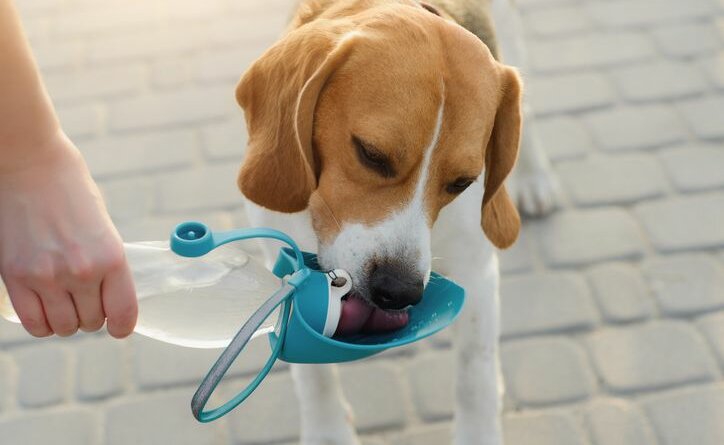Why Is My Dog Drinking A Lot of Water? – Dogster
Keeping hydrated is important for all of us — our dogs, too. How much water our dogs are drinking can actually tell us a lot about their general health.
Excessive thirst in dogs can result from something as simple as recent exercise to a more complex underlying medical condition.
Dr. Annette Louviere, of Wisdom Panel pet DNA testing service, says that while dogs can normally change their water intake from day-to-day, any fluctuation that persists or any sudden, drastic changes in their habits could be an indicator of an underlying health condition.
What causes excessive thirst and urination in dogs?
Dr. Louviere says other causes of increased water intake in dogs include the type of food they’re eating (dry food can make them more thirsty), hot weather, playing, certain medications, infection and even boredom.
She says increased urination in dogs could have several causes. Urinary tract infections (UTIs) or urinary stones may be the culprit in many cases. More serious kidney disorders or endocrine conditions like Cushing’s disease, are possible, too.
Signs of kidney disease in dogs
Excessive thirst may also be a sign of kidney disease in dogs. Other signs of kidney disease in dogs may include:
- Increased (or sometimes decreased) urination
- Lethargy
- Lack of appetite
- Nausea and vomiting
- Weight loss
Signs of diabetes in dogs
Signs of diabetes in dogs also include excessive drinking, along with:
- Increased urination
- Weight loss — especially paired with increased appetite
- Chronic or recurrent infections
But drinking more water isn’t always a sign of a larger medical problem. Dr. Louviere says it’s good to consider the big picture and take into account if there are any other notable changes — like appetite or energy levels — as well as your dog’s age and lifestyle.
When should you be concerned?
Dr. Louviere says to see a vet if you notice any fluctuation from your dog’s normal level of water drinking that is persistent — or if you see sudden, drastic changes in your dog’s drinking habits. If your dog is drinking much more water than usual and he’s a senior, a trip to the vet is a good idea. When in doubt, give your vet a call. Note any other unusual symptoms your dog is exhibiting — like changes in appetite levels and urination.
She says a vet will likely start with a physical exam in order to determine the best course of action. Then bloodwork and urinalysis to help rule out (or rule in) different conditions like kidney disease, diabetes or Cushing’s disease.
Water intoxication in dogs
While keeping hydrated is important, our dogs can get too much water. Dr. Louviere says there’s a condition called water intoxication often seen in dogs who like to play in water for long periods — especially those who continuously lap at the water while playing in it. It’s rare but severe cases are potentially fatal.
Symptoms of water intoxication may include:
- Lethargy
- Loss of coordination
- Nausea and vomiting
- Excessive salivation
- Bloating
- Dilated pupils
- Trouble breathing
- Seizures
- Coma
What to know about dogs drinking water
Monitoring how much water your dog is drinking can help pet parents gain valuable information about dog health. But it doesn’t always mean something serious. Sometimes it just means your dog is hot.
For pet parents with water-loving dogs who enjoy playing in the pool regularly, water intoxication is something to keep in mind. Dogs can ingest too much water while playing in water that can lead to this potentially fatal condition. Keep an eye on how much water your dog is taking in during water play and give him plenty of breaks to relieve himself.
Generally, if you notice any big changes in your dog’s water drinking, pay your vet a visit and note any other changes in your dog to help determine if there’s an underlying medical issue.




